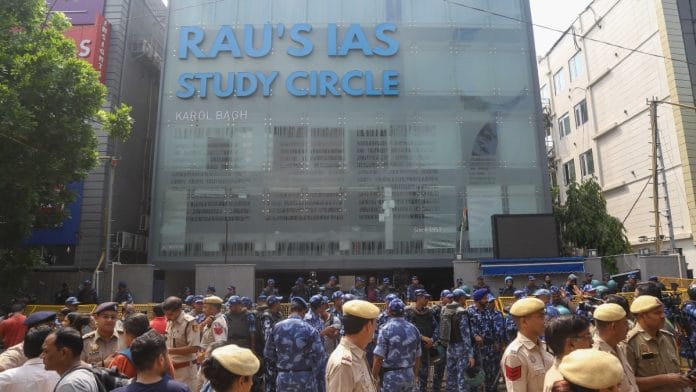The recent deaths by drowning of three students in a flooded basement in Delhi has shaken the entire nation. More so because they were under the care of a coaching centre running its commercial activities from that basement illegally. Even more appalling was the response of the municipality, Jal Board, local politicians, and the coaching institute—Rau’s IAS Circle—to the fervent pleas of the students, just before the flooding incident.
And yet, typically, politics crept in with the blame game, obfuscating the real issues. The central government moved in with the usual palliatives to smoothen ruffled feathers and wait for the situation to blow over. Trivialising the tragedy, the Delhi police arrested a man who was driving his SUV through the flooded street. Needless to say, the broader issues of illegal basements, flooding, housing, and cramped spaces caused by coaching institutes will continue to evade scrutiny.
Governance institutions operate, or should operate, irrespective of the political party in power. They do not need a lieutenant governor or chief minister to respond to a citizen’s call for civic action. It is fairly evident that the Municipal Corporation of Delhi (MCD) has messed up in handling the issue of illegal basements in Delhi. Can this problem be resolved at the level of a junior engineer or even a deputy commissioner? No! It falls to the municipal commissioner, Ashwani Kumar, because he is aware that lakhs of basements are operating illegally.
Either Kumar decides that all should be demolished, not sealed, or he quits, saying that political pressure or other forces prevented him from taking action. Why hang on to the job, pushing only routine files? It is a very important position, with selection done from various IAS officers countrywide. With such a post comes responsibility. But Kumar never made a statement for the public. An engineer gave a statement that nothing was wrong and a junior engineer was suspended. Then why not make the chief engineer the MCD commissioner? At least he knows the job and gave an opinion — whether right or wrong.
The Delhi Jal Board is responsible for supplying drinking water, as well as for collecting, treating and disposing of waste water/sewage in the capital. Most of the storm water drains are covered and blocked by house owners. As a result, flooding is inevitable. Who is responsible for clearing the mess — a lower-ranked officer with no clout or Jal Board CEO A Anbarasu, who is another IAS officer who has chosen not to make a statement on the issue? He should make a statement to the public about regular flooding in Delhi and the status of storm drains. If he cannot clear the drains because of any pressure, he should quit. Important positions cannot be held just for attending to routine functions.
Travesty of justice
The senior-most officer in Delhi is the chief secretary who has his eyes and ears on everything. Naresh Kumar has a right to question anyone on any matter relating to Delhi. He has full right to ask the MCD commissioner why illegal basements flourish despite the ban on commercial use or why storm drains are not cleared, because both impact the capital’s citizens’ lives. But has he done it? He has also made no statement on the issue.
This is similar to the crime situation in Delhi, where gangs are active and a spate of incidents is taking place, but the Delhi police commissioner chooses to remain quiet. Unfortunately, our bureaucrats hide behind rules and conventions that suit them to avoid responsibilities. But choose names like Ashok Khemka IAS or Sanjiv Chaturvedi IFS or Vikram Singh IPS for these positions and results will be seen in weeks.
While bureaucrats avoid responsibility, politicians take the issue to a new farcical level. What prevented the local councillor, MLA and others from staging a dharna outside the coaching head’s office to close the basement, the MCD commissioner from declaring it illegal, and the Jal Board CEO from clearing the storm drains? Why hasn’t Delhi L-G Vinai Kumar Saxena questioned these officers on their role yet?
After this crisis at least, Delhi Chief Minister Arvind Kejriwal should hand over his post to another Aam Aadmi Party (AAP) leader by choice of MLAs. What a travesty of Justice! Chief minister in Jail, but not handing over power. Chief secretary on two extensions without the CM’s consent, reporting only to the L-G as do all the officers and ignoring the directives of AAP ministers. A mayor (Shelly Oberoi) who does not have any power. MCD, Jal Board, and police chiefs not accountable to the CM but to the Union home ministry.
Who can resolve this political gridlock? After the passing of Delhi Services Act 2023, which overturned the Supreme Court’s constitutional Bench verdict, it is now up to the Supreme Court again to make a final decision after hearing the Delhi government’s challenge to the Act. Meanwhile, the paralysed administration in Delhi will continue to flounder from one crisis to another.
Lastly, in the present state of flux, the home ministry appoints a committee to investigate the lapses in the basement incident, hold the culprits responsible, and adopt a policy for the future. The report will come in a month. What is puzzling in the entire exercise is that the culprits can easily be apprehended by police investigation, if they are allowed a free hand. Secondly, policies regarding basements, drainage, and roads are already well defined. It is just a question of truthful implementation. So what value will this Committee report add to the table?
It is not the fighting, screaming and kicking politicians or high-ranking IAS and IPS officers who can solve Delhi’s unending problems, but sober, upright politicians and officers with intent and spine who can save Delhi from the upcoming disaster.
Yashovardhan Azad is Chairman of DeepStrat, a former Central Information Commissioner, a retired IPS officer who served as Secretary, Security, and Special Director of the Intelligence Bureau. Views are personal.
(Edited by Prashant)






